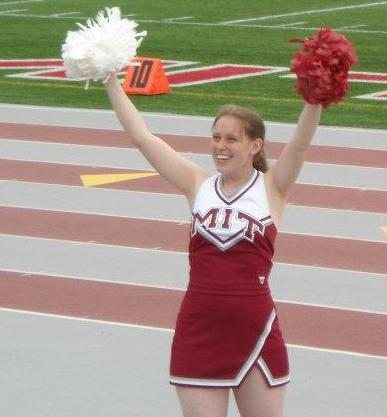Science Cheerleader Hilary here to introduce you to Science Cheerleader Kelly, who both coaches and is a member of the MIT Cheer Team and is completing her PhD in Computational and Systems Biology there! Read on below to learn all about Kelly’s amazing work in both STEM and Cheer! Also make sure to check out the profile of Kelly’s team at MIT!
 Kelly did her bachelor’s degree in Engineering Sciences at Harvard and is now finishing her PhD in Computational and Systems Biology at MIT!
Kelly did her bachelor’s degree in Engineering Sciences at Harvard and is now finishing her PhD in Computational and Systems Biology at MIT!
What turned you on to STEM and when?
I always really liked asking questions, which my parents really encouraged! In the second grade, I had an amazing teacher named Mrs. Henderson who let me borrow her laptop computer to write a report on bats. Back then, laptops were really rare, and I remember thinking how cool it was that I was getting to play with an actual computer. She also encouraged me to read everything that I could. As I got older, I loved my science classes because they focused on how to ask good questions and get good answers about the world around you. I went to the South Carolina Governor’s School for Science and Math in high school, and getting to do a real scientific research project the summer before senior year really made me see that doing science was my passion!
Why did you try out to be a cheerleader?
I first tried out to be a cheerleader for my middle school team – I was really loud and had a lot of school spirit, so I thought it would be a perfect fit! I loved being part of a team, where we were all working towards one goal. I cheered and danced in high school, took a break in undergrad, and came back as a graduate student member of the MIT team!
 Please describe what you do in your science career on a daily basis.
Please describe what you do in your science career on a daily basis.
In biology, you pose a question about the way that something (a protein, a cell, an organism) interacts with its environment, and then you create an experiment that can test that idea. Sometimes, however, the experiment would take too long to do, or might be impossible or impractical with current technology. That’s where I come in. I use math to make computer models of what would happen if we did the experiments, so that we can collect evidence for our questions without having to do the full experiment. The questions that I’m asking are centered around how proteins have evolved to handle stress that’s placed on the cell. A lot of human diseases are associated with proteins that lose their shape, and we hope to study why and how that happens.
What does it mean for you to be studying STEM?
Being a scientist, and being able to discover things that nobody else in the world knew until me, makes me incredibly happy. I also like the fact that my research tries to answer “big questions” like understanding how our cells are capable of handling stress like starvation or temperature fluctuations. These cues (including random chance) have direct implications to understanding what makes some diseases so harmful to humans. Understanding protein folding and interactions in this context is like a big puzzle, and I am so lucky that I get to help fit a tiny piece of the puzzle into the whole.
How do the qualities that make you a great cheerleader benefit you in your STEM career?
In both things, having passion for what you’re doing and having the self-confidence to do it are hugely important! When you’re competing, there’s this saying to “leave it all on the mat” – do your best, don’t be afraid, believe that your stunts will hit, and give the performance of your life. In science, loving what you do and not being afraid to do it are what will allow you to come up with completely new ideas that can reshape what we know about our world.
What advice do you have for people facing stereotypes about cheerleaders and women in STEM fields?
Stereotypes are problematic because they attempt to put people in boxes, preventing them from exploring everything except for very specific goals. It would be a very boring world if everybody had to fit into very narrow stereotypes! Liking lots of different things – like science and cheerleading – allows us to learn from multiple fields and apply the lessons we get from one pursuit to the other. When I was growing up, I hated being told that I wouldn’t win an academic competition because I was a girl, or that I couldn’t be a cheerleader because I was a huge bookworm. Ultimately, you have to do what you love – call out bad stereotypes, and prove them wrong!
Best cheerleading experience?
My last time competing at Nationals – we hit an almost-clean routine, and I loved being on the floor with my teammates!
Best science/health-related experience?
Finding out that my first paper in grad school was going to be published. We were so excited about our model’s results, and it was great being able to share them with the world!
What advice would you give your 12-year-old self?
Sometimes people can be incredibly mean, and sometimes they can be amazing. Don’t give up on yourself and your dreams!
What’s one thing people might find especially surprising about you?
My all-encompassing love for history trivia!

